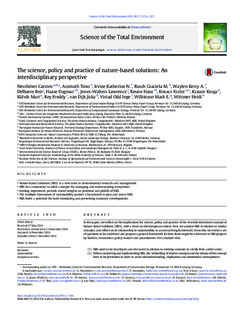The science, policy and practice of nature-based solutions: An interdisciplinary perspective
Nesshöver, Carsten; Assmuth, Timo; Irvine, Katherine N.; Rusch, Graciela; Waylen, Kerry A.; Delbaere, Ben; Haase, Dagmar; Jones-Walters, Lawrence; Keune, Hans; Kovacs, Eszter; Krauze, Kinga; Külvik, Mart; Rey, Freddy; van Dijk, Jiska Joanneke; Vistad, Odd Inge; Wilkinson, Mark E; Wittmer, Heidi
Journal article, Peer reviewed
Permanent lenke
http://hdl.handle.net/11250/2426285Utgivelsesdato
2016Metadata
Vis full innførselSamlinger
- Publikasjoner fra CRIStin - NINA [2397]
- Scientific publications [1423]
Originalversjon
10.1016/j.scitotenv.2016.11.106Sammendrag
In this paper, we reflect on the implications for science, policy and practice of the recently introduced concept of Nature-Based Solutions (NBS), with a focus on the European context. First, we analyse NBS in relation to similar concepts, and reflect on its relationship to sustainability as an overarching framework. Fromthis, we derive a set of questions to be addressed and propose a general framework for howthese might be addressed in NBS projects by funders, researchers, policy-makers and practitioners. We conclude that: (1) NBS need to be developed and discussed in relation to existing concepts to clarify their added value; (2) When considering and implementingNBS, the ‘relabelling’ of related concepts and themisuse of the concepthave to be prevented in order to avoid misunderstanding, duplication and unintended consequences; (3) NBS as currently framed by the European Commission provides an opportunity for: a) transdisciplinary research into the design and implementation of solutions based on nature; and b) overcoming a bias towards development alternatives with narrow perspectives that focus on short-term economic gains and effectiveness; (4) The strength of the NBS concept is its integrative, systemic approach which prevents it from becoming just another “green communication tool” that provides justification for a classical model of natural resource exploitation and management measures. To realise their full potential, NBS must be developed by including the experience of all relevant stakeholders such that ‘solutions’ contribute to achieving all dimensions of sustainability. As NBS are developed, we must also moderate the expectations placed on them since the precedent provided by other initiatives whose aim was to manage nature sustainably demonstrates that we should not expect NBS to be cheap and easy, at least not in the short-term. © 2016 Elsevier B.V. All rights reserved.

